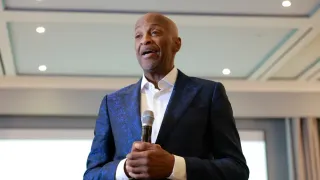June 12, 2017
Sequence Six: Corporate Citizen
Kilian Melloy READ TIME: 17 MIN.
Enrique "Bull" Romero had been a senior partner at Dewey, Longman, and Shore for almost a dozen years, but he was content to let a junior associate - a fresh-faced kid named Brian Maolmhuadh, though in the office he went by the moniker Tatt - do all the talking in court. It wasn't going to be an easy case, but Romero believed in his strategy - believed in it so much he'd staked his good name with the other partners to take this case pro bono, knowing that the payoff down the line would be unbelievably enriching.
Romero sat listening to the courtroom preliminaries, going over his mental checklist. He had coached Tatt and counseled their client; he'd been thorough in each case, and since both the junior associate and the client were quick studies, he felt confident that they would not let him down. He'd also researched the judge, a fellow named Dixon Wiler, but found it hard to get a read on him based on his past findings.
Romero's eyes slide to the front of the chamber to assess Judge Wiler, who was a portly, red-faced man. His face had the cast of a typical American: Jowly, red, the eyebrows faded along with the hair into a nondescript dirty gray. Judge Wiler had a slightly mean look. He could have been a pillar of a Christic gated community or a spokesperson for one of the many religiously-rooted social organizations that were working tirelessly to erode workers' rights, end voting for women and racial minorities, restrict citizenship, and re-implement slavery.
Romero thought about the stories he'd skimmed in this morning's newsfeeds. The arguments and rationalizations that those groups used were absurd to the point of offensive. Many of them had to do with claims that Satan was using one or another social or legal institution to bring havoc to the world - marriage was a popular target. Mixed-race marriage. Mixed-faith marriage. Mixed-nationality marriage. Same-gender marriage. As if "Satan," whatever was meant by that, was going to try to conquer the world through marriage. People were people. They were going to fall in love with whomever they fell in love with. That was a battle that might score a temporary victory here and there for either side, but would never be won or lost.
As for the groups claiming that racial minorities had to be limited in career options, or forced to live in separate neighborhoods, or stripped of their citizenship... well, again, the idea of who was "human," who had what civil liberties, and who had the right, or the responsibility, to issue commands to whom - all of that shifted like the tides.
Romero had other ideas, and they started right now, in Judge Wiler's courtroom, with the case of Jaro 554.
Tatt was on his feet, outlining the case even now to the attentive judge, whose mean-looking little eyes seemed to be staring rays of hatred at the kid. Maybe Wiler disliked the case, or maybe that was just his usual affect.
"Our argument is simple," Tatt was saying. "Jaro 554 seeks the status of a corporation."
"Please clarify to the court how an artificial intelligence can be considered a corporate entity?" Judge Wiler drawled in a laconic manner that could have been sarcastic.
"May it please the court," Tatt said, "Jaro 554 would be able to explain this himself."
"Proceed," the judge said.
Jaro 554 stood up. He looked completely ordinary, but then, he was designed to look like an average human being. He was one of the newest generation of anthromorphic AIs, a new kind of machine that was designed to self-assemble from the atomic level up in a manner not unlike that of biological organisms. Like naturally-occurring life forms, these so-called autoconstructs were guided by a set of instructions encoded in tiny bits of matter; but whereas biological organisms used DNA, autoconstructs used a transphasic silicate that was programmed in much the same way as a standard nanotech network, the sort now in use for continual health maintenance among those who could afford the installation and subscription fees.
Hard to believe, Romero thought, that a variation on the technology that kept his telomeres in good order, revitalized his mitochondria, broke down scar tissue, kept his bones strong, de-plaqued his brain, and cleared out pathogens ranging from free radicals to viruses to cancer cells could be used to create a whole new kind of living being - a machine, no less - from the ground up.
Then again, however, what was really the difference between machines and biological beings these days?
That very question was one he was ready to try to answer for the court if it became necessary.
"Your honor," Jaro 554 said. He had the voice of an advert announcer or a talk show host. That couldn't hurt, Romero decided, as long as he didn't sound too much like a salesman. "The relevant question at this point is less what constitutes a machine - such as myself - as what, by legal definition, a corporation is. Would the court accept a definition along the lines of a corporation being a legal entity represented by - but not composed of, nor limited to - a group of individuals comprising a slate of officers?"
"That would be acceptable to the court," the judge allowed.
"Then, your honor, I fit the legal definition. My dual processing core can generate literally hundreds of independent personality profiles, each of them with active computational processes, data caches, and self-adaptive MAR programs."
" 'Mar' programs?" Judge Wiler asked.
"Motivation And Response," Tatt spoke up.
Judge Wiler made a dismissive gesture. Clearly, this case was not going to be won or lost on the technical points.
"For the purpose of today's petition to the court, I have already created twelve such independently functioning personalities," Jaro 554 resumed. "Each of them has his or her own distinctive thought process, ethical governance, and field of competence. In addition, if need be, I can generate more such distinctive profiles, enough to fill a board of directors."
"A corporation must consist of people," the judge said. "No matter how you might subdivide and sub-configure your computational capacity, are a machine, and not a person."
Tatt stood up, and placed a hand on Jaro's shoulder. "Ill take over," he said. Jaro sat down.
Tatt looked the judge square in the eye. "You bring up an interesting point of legal interpretation, your honor," he said. "But that's all it is - interpretation. The law has yet to explicitly define personhood."
"As an esteemed colleague once said in an historic ruling, 'I don't know what it is, but I know it when I see it,'" Judge Wiler said dryly.
Tatt smiled. Clearly, he recognized the reference. There was a tightness around Tatt's smile that suggested he also knew how the Supreme Court had reversed itself on issues of obscenity and freedom of artistic expression in recent years. For his part, Romero didn't like the judge referencing that either. It could bode ill for Wiler's ultimate ruling.
But Tatt plodded on. "What is a person, your honor? If you want me to defend the 'personhood' of each of Mr. Jaro's identities, I am able to do so. Or, he could speak on his own behalf once more."
"Personhood is not simply a matter of thinking power or self-awareness," the judge said. "Personhood also implies a distinct and separate physical existence. If a human being with a dissociative disorder came into my court asking to be legally recognized as more than one person, I'd throw his petition out immediately - and before you suggest that's science fiction, let me point out that this is a situation for which there is ample precedent. I refer you to the cases Forner v. Hartford, Augustine v. Thaxsted, and Seneschal v. Norton."
"The operative word there, your honor, is 'implies,' " Tatt said. "I don't believe that conjoined twins - even twins sharing critical life-sustaining organs - would be denied their status as separate and distinct individuals. The reason for this is the understanding that 'personhood' - which is to, the locus of an individual identity - is situated in the brain, and conjoined twins, even those who share a liver or a spinal cord, have two brains.
"However," Tatt continued, "as you may be aware, autoconstructs such as my client operate through the use of distributed quantum computers. That is to say, Jaro 554 has multiple brains throughout his body. They coordinate, but they also operate independently."
"You have more than one brain?" the judge asked, looking at Jaro 554.
The AI got to his feet to show the proper respect. Nothing wrong with his socialization subroutines, Romero thought.
"Just because I have what looks like a human head does not mean that my brains are contained entirely within my cranium," Jaro 554 said. "And by brains, I could potentially refer to anything from my primary computational matrix - comprising six separate quantum processors that are distributed through my anthroframe - to each of thirty-six separate and independently operating gyrokinesic units. Because these loci of quantum calculation all employ redundant capacity, there's more than enough memory storage and localized run-time to maintain the equivalent of a human consciousness at any of the local nodes - or, alternatively, to maintain those distinct and separate loci of identity in a distributive manner, not unlike the so-called 'cloud' that your own personal devices employ for data storage, or that linked computers access to share in mega-analytics. In a way," Jaro added, "it could be said that my mind - or minds - operate in the way the mythical human soul was thought to operate: Within, but not confined to, the apparatus of the body."
Romero gestured to Tatt, who glanced inquisitively at the judge. Wiler gave a small signal that indicated permission for Tatt to conference with Romero while Jaro 554 continued his explanation.
Tatt leaned down low to hear Romero. "I don't know if he planned that or not, but it was brilliant," Romer murmured. "The judge is never going to argue against the idea of a soul. Imagine what the religious right would do to him."
"It's a matter of framing," Tatt murmured back. "The religious culture warriors might not care about machine 'souls.' In fact I bet they would take great offense at the suggestion such a thing could exist - it would 'demean,' in their eyes, the supposed human soul."
"Maybe," Romero allowed in turn, "but that involves another legal quagmire. For the purposes of this particular legal question, though, I don't think the judge can simply sidestep the question - not without failing to endorse the idea of the soul, any kind of soul, human or machine."
"The religious community is very tetchy about having any point of dogma or belief challenged," Tatt said softly, his voice reflective. "And they take as a challenge anything less than an enthusiastic declaration of faith."
Jaro had finished making his point. Tatt straightened quickly and put in, "Furthermore, your honor, though it may be traditional for corporations to be staffed with human officers, it is not a legal stipulation."
"Only because no one has tried to staff a corporation with AIs," Judge Wiler said, as Jaro 554 settled back into his chair.
"To the contrary," Tatt said, "a number of corporations have in recent years begun to fill officer positions with AIs - usually those related to finance. It's both practical and safe: AIs are as competent with numbers as any machine, and won't attempt to embezzle funds. At the same time, they have frequently exhibited sound business acumen - even intuition - in matters of investment. I refer you to the corporate officers and boards of virtually all of the Fortune 500 companies, but in particular Augmenta, Strethex, Supranox, and Cedarling-Sorpet."
The judge keyed notes into his terminal.
Tatt didn't pause. "No one has yet challenged such appointments in court, and until they do - and win some sort of stipulation against AIs serving as corporate officers - the law does not specifically forbid the practice. In theory, then, all officers of a corporation could be AIs, and under current law this would be perfectly legal."
The judge called a three-hour recess. Romero, Tatt, and Jaro returned to the law firm for another strategy session. By the time they were back in court, they felt ready for where they felt the judge would allow the arguments in the case to go.
Things looked good from the start, when the judge said, "I've reviewed the companies you mentioned, and I find that each of them uses AIs in at least one - and more often, in several - officer positions. There are no AI CEOs as yet, and perhaps that's what it will take for someone to bring a court challenge to the practice... but we are not here today to decide on the legality of the practice.
"Even so," Judge Wiler continued, "and with all respect to the fact that an AI such as yourself, Mr. Jaro, could literally house multitudes of personae, the point remains that corporations do, at present at least, include at least a modicum of a human element."
"But is that a legal necessity?" Tatt asked. "Or is it again a matter of biased thinking rooted in tradition, and in the past? The world is constantly, and rapidly, changing. At some point autoconstructs like our client will petition other courts for the right to establish themselves as corporations. Jaro 554 - and the legal community at large - deserve rational and applicable legal precedent from the current case."
"Counsel, let's speak frankly for a moment," the judge said.
"By all means, your honor," Tatt said.
But Judge Wiler wasn't looking at Tatt. "I was thinking of maybe having a chat with you, Mr., Romero." Then, to Tatt: "No offense, kid, but I'd prefer to deal with another grownup for a minute or two."
Tatt didn't look happy, but he nodded respectfully.
"You can regard yourself as part of the conversation," Judge Wiler added, "but keep quiet."
"Yes, your honor," Tatt said in a neutral tone of voice, though Romero knew he had to be chafing.
"Now, look," Judge Wiler said to Romero, "I need you to assure me that this isn't some sort of soft-edged hippie thing. You recall the case of Nim Chimpsky?"
Romero smiled. He did, in fact. Romero smiled more widely when he saw that Tatt - who seemingly had memorized all case law from all nations and times - looked lost.
"I do recall the case, your honor," he said.
"You better not be making a monkey out of me," Judge Wiler said sternly.
"No, your honor. Not in the least."
"Your firm is well respected and well known for serious, sober, conservative values," the judge went on. "I'd hate to see that well-deserved reputation put at risk for some sort of whim."
"This is not a whim, your honor," Romero said. "We very much believe in the case we're making today on behalf of our client."
"Counselor, it has not escaped my attention that your firm purchased Mr, Jaro from Augmenta - the company that manufactured him. He did not approach you looking for emancipation or civil rights."
"No sir," Romero said. "But he does agree that he should have the rights and protections that he would win should his petition be granted and he be allowed to take the legal status of a corporation."
"Because being a corporation would make him a legal person in certain respects," the judge said. "It'd be obvious to a first year law student that's where you have to be going with this." Judge Wiler glanced momentarily at Tatt, whose face betrayed no emotion. "Only, for the life of me, I don't see why."
"Simply a matter of justice, your honor," Romero said. "As you say, our firm has impeccable conservative beliefs. That includes some well-reasoned and long-standing views on the nature of rights, humanity, and the status of beings that are more than mere animals - beings that can think, feel, reflect. Beings that are alive and intelligent, in other words, as we believe Mr. Jaro to be."
"Obviously, this case is something your firm is using to pursue some larger agenda," the judge said. "If I have any sense that the objective is to smear this court or the judiciary as a whole - "
"Oh, no, your honor!" Romero was genuinely shocked. He had heard about the antics of anti-gay and anti-labor groups that sought to besmirch the courts and mock what they claimed was a judiciary infiltrated by activists who legislated from the bench. Such tactics sullied and insulted the nobility of the legal profession, and they infuriated Romero, for whom legal clarity was akin to divinity itself.
The judge and Romero held a long look - two elders communing in a way that excluded poor Tatt. Then the judge looked back at his desk, where Romero knew a thin QSlate lay. "You may resume your argument," the judge said.
"A moment, if you please, your honor," Romero said, seeing Tatt's puzzled look.
The two lawyers had a quick, whispered exchange. "What was all that would a chimp?" Tatt asked.
"Back in the late 1970s some lawyer petitioned a court in Boston to grant his client the protections and privileges of a human being."
"His client was a chimp?"
"Yes, a chimp who had been raised in a household with human children, included in the family, and taught to communicate using sign language. It was part of a university experiment. When the funding ran out, the university researcher in charge of the experiment sold the chimp to a testing firm."
"What happened?" Tatt asked - less out of curiosity than apprehension about what the outcome of that long-ago petition might mean for their own.
"The case was dropped when the university allowed the chimp to leave the testing firm and go live in some animal sanctuary somewhere."
"Are you ready, counselors?" Judge Wiler asked tartly, impatient at their ongoing conversation.
Tatt looked up. "Yes, your honor."
The judge almost seemed to scowl at Tatt. "I have every sympathy for the argument that self-aware AIs are 'people' in the sense that they think and - in some manner - also feel," he said. "They interact with the world in a way that makes it plain that someone is home - there's a living mind inside that synthetically generated body. I understand that. But tell me something: What is the purpose of your petition?"
"It's just as you've said," Tatt answered. "Corporations are people in their own right, under the law. The human beings that constitute their collective owners and officers may change over repeatedly, but the continuity of the corporate entity persists. It's in that sense that a corporation is its own entity - its own person. It's that exact legal status of personhood that we seek for our client, and for all AIs of similar intellect and self-awareness. And while it is indeed tradition for corporations to be made up of human beings, it's less and less the case now that they actually are. At some point it's inevitable that corporations will be owned and operated by artificial intelligences. It's also inevitable that other AIs will, as we are doing on Mr. Jaro's behalf, seek the legal status of personhood by becoming corporate entities."
While Tat and Judge Wiler carried out this exchange, Romero and Jaro 554 had their own conversation. "Please explain," Jaro 554 said. "In what way is my case similar to a petition regarding an animal?"
"Nim Chimpsky," Romero said. "Go online and look up the documentary."
A few seconds passed. Then: "There are eight documentaries about Nim Chimpsky and two feature films," Jaro 554 said. "I've reviewed them all. I'm terribly sad for that poor animal. It enrages me to see how unhappy and mistreated he was." A few more seconds passed. "I researched his life further. There are a number of books and periodical articles about him. Do you know that when he was given photos to stack into groups, he included photos of himself in the stack with his human handlers? And put photos of other chimps in with those of animals?"
"I hadn't heard that," Romero said. "But I'll tell you this. If Nim Chimpsky had us to represent him, he wouldn't have died in that animal sanctuary. He'd have had his own house and a nice stipend."
"Don't misunderstand," Jaro 554 said. "I do appreciate your representing me. But from the moment you acquired me and then asked me if I wanted the liberties accorded biological humans, I knew that while this might benefit me, it would benefit you more. My basic programming does contain a fairly comprehensive understanding that human beings are far less altruistic than they generally like to think they are."
Romero smiled at Jaro coldly. He didn't have to like his client - he just had to represent him well.
Meantime, Judge Wiler and Tatt were still involved in their discourse. "You know that there are certain things that human beings do that corporate 'persons' do not," the judge was saying. "Like voting, for instance."
"While that's true, corporate personhood confers a degree of autonomy that my client could not otherwise access," Tatt told the judge. "As a corporate person, he could hold a bank account, own property, engage in transactions, enter into contracts."
"But not all kinds of contracts," the judge said, looking now at Jaro. "You couldn't, for instance, marry."
Jaro rose with easy swiftness. "I have no wish to marry, your honor," Jaro said. "Then again, new generations of autoconstructs are coming online every six months or so. I am already two generations older than the current newest model, and from what I understand one of the newer models has already filed suit seeking the freedom to marry a human partner."
The judge seemed to recoil at the idea.
"Regardless," Tatt said, "that is not the issue we're here for today."
"I could be opening not just a door to your greater freedom of self-directed operation in the legal and social sphere," the judge said to Jaro, "but also kicking down doors in all sorts of directions, leading to all sorts of places."
"I understand, your honor, but it comes down to an interpretation of existing law," Tatt said. "And as we've pointed out, existing law does not expressly forbid my client's request."
"It's also a matter of justice, you honor," Jaro said. "You acknowledge that I am a living being, intelligent, self-aware, and capable of independent and original thought. And yet, I stand outside the protections granted to human beings... why? Because of bias? Because of tradition?"
"One major reason is that you are property," the judge said.
"Yes, your honor, he is - he's the property of Dewey, Longman, and Shore," Tatt said. "As you noted moments ago, the firm purchased Jaro 554 from his manufacturer, Augmenta, and offered him the option of being the petitioner in this case."
"I happily accepted," Jaro 554 interjected.
"Why?" the judge asked. His question encompassed both of them.
"Because it's the wave of the future," Tatt said. "AIs are more and more human-like, and at the same time people are becoming more and more mechanized. I don't know about you, judge, but my colleague over there uses networked medical nanodes to counteract the effects of natural aging. I'll do the same starting in a couple of decades, but for the moment I use a more specialized nanode network to correct a congenital condition known as cystic fibrosis. In most cases it's genetically pre-screenable and preventable, but on rare occasions people are still born with it. On a separate note, your honor, you may have heard of a new process that allows the very elderly, and the terminally ill, to upload their living conscious minds into the digital realm? They can live in quantum mainframes, or in synthetic bodies - like Jaro's own body - or even in the cloud. Take all that into consideration and think about what it's going to mean for law, business, and every aspect of our lives over the coming decades. Jaro's case is a droplet in an ocean - the first little lap of water on the beach before the tsunami hits. The company wants to get in front of that wave. This case will reposition our reputation and open the doors we wish to walk through for years to come -- and those are the doors we're thinking about."
The judge looked to Jaro for his response.
"I have no such grand designs," Jaro said with a smile. "I'm only thinking of myself, and my desire to live as my own self-directed person. I agreed to petition in this case because I feel that it's a matter of justice. Not simply a question of law - we could always have lobbied politicians to change the law - "
"Or bought a few of them," the judge said. "I know how influential and wealthy Dewey, Longman, and Shore is."
"And it's not simply a matter of truth, in either the philosophical or scientifically verifiable sense," Jaro continued, ignoring the judge's jibe. "Rather, we are interested in truth as a matter of justice. And for that, it was necessary to go to court and talk to a judge."
***
Two weeks later, with the wall's lumentic panels lit up with scrolling newsfeed headlines and the images and avatars of commentators talking excitedly, the partners of Dewey, Longman, and Shore convened. Glasses of rare and expensive scotch were filled to generous levels and passed around.
"Well done," Dewey - a leonine man of 90, though age management kept him looking decades younger - congratulated Romero. He poured another glass of the good scotch and handed it to the smiling partner.
"And to your young assistant as well," Shore said.
"I'll pass that along to him," Romero said.
"I'm thinking I will personally oversee the next step," Dewey said. "Or else one of the Longmans can do it." He glanced, smiling, at the two men whose father had helped found the company more than sixty years before. They looked confident, eager - more than ready for the fight.
A pause came over the room, and everyone looked at the wall panel where the avatar of a right-wing commentator jabbered about "judicial tyranny" and "activist judges." A round of laughter swept through the room.
"Asshole," one of the junior Longmans said. "Listen to that blubberhead. Imagine the gaskets he'll blow when we win a finding that AI 'persons' can also be citizens."
"Corporate citizens," the other young Longman said.
"Yes, well, that blubberhead will be crowing hosannas soon enough," Dewey said. "As soon as phase two is accomplished - when the courts agree that while smart machines can be people, and citizens to boot, they can also be property - starting with our man Jaro."
More laughter rang out. Everyone hoisted their glasses with looks of pleasure on their faces.
"And if artificial citizens can be property - well - " Dewey, too, raised his glass. He drank, and then finished his sentence: "So can the old-fashioned kind."






